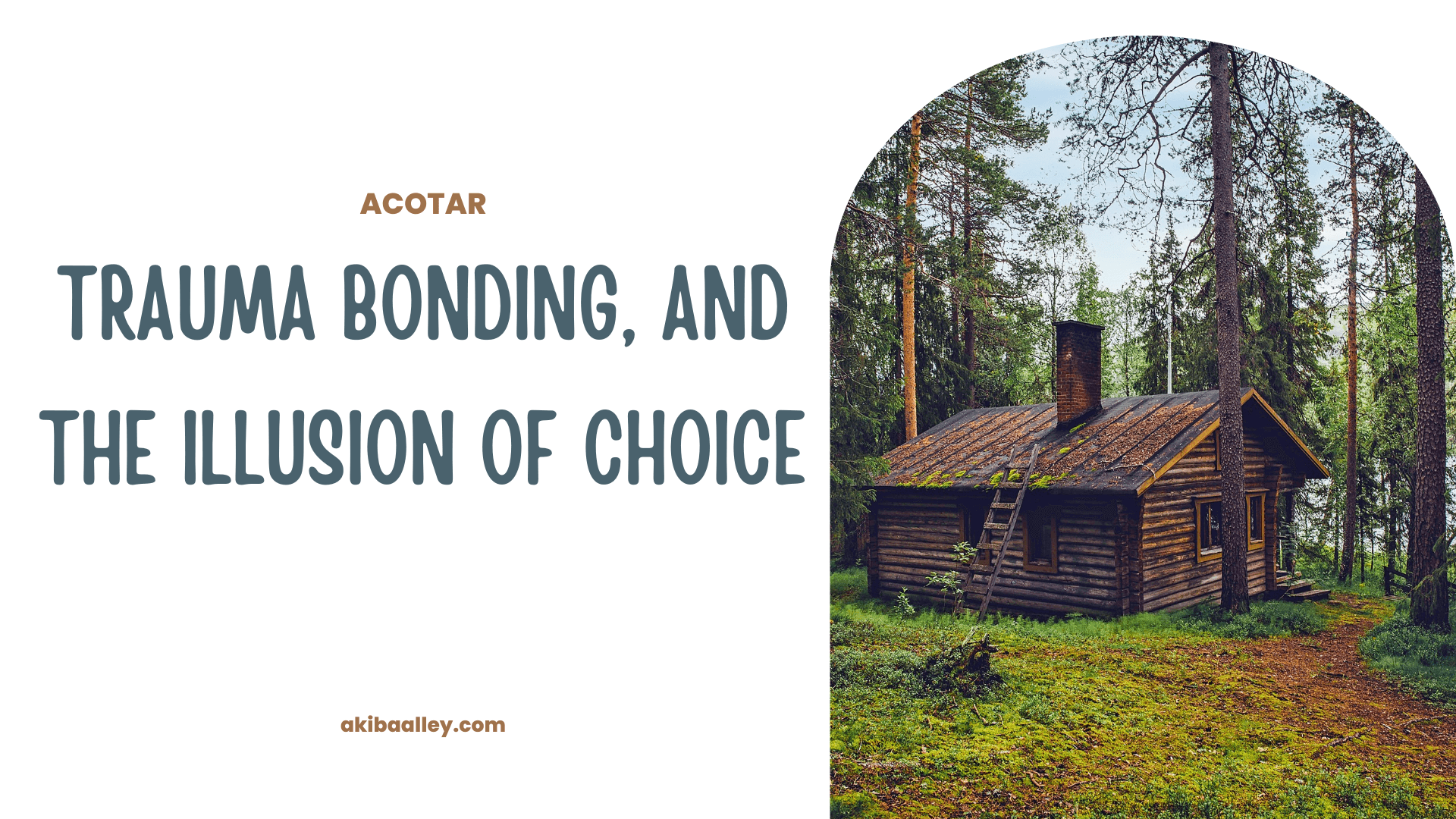In A Court of Thorns and Roses, Feyre Archeron’s journey is often celebrated as one of strength, resilience, and transformation. But beneath the arc of growth is a quiet, unsettling exploration of what happens when a person is deprived of safety, affection, and education for too long. Feyre’s choices, particularly in love and loyalty, are not as empowering as they may seem at first. They are, in many ways, the choices of someone conditioned to survive rather than live freely. Her relationships with Tamlin, Rhysand, and even the inner circle reveal deep patterns of trauma bonding, self-sacrifice, and a lack of emotional literacy.
A Life Built on Isolation and Survival
Feyre is introduced as a girl living on the edge of starvation, burdened with the responsibility of keeping her family alive. Her isolation begins not in Prythian but in the human realm. Emotionally and physically, she is stranded. Her family does not share her burden, nor do they see the toll it takes on her. Her father, once a wealthy merchant, is broken and passive, with no desire to reclaim his role as a provider. This leaves Feyre, the youngest daughter, in the impossible position of becoming the family’s caretaker and protector.
“I knew how to survive, how to find food, how to defend myself. But I didn’t know how to laugh, how to live.” – ACOMAF
Her relationships with her sisters only heighten this isolation. Nesta and Elain are close to each other, forming a unit that Feyre is never truly part of. Nesta, sharp-tongued and proud, often clashes with Feyre, treating her with coldness and disdain. Feyre interprets this as resentment, and their relationship simmers with unspoken tension and unacknowledged pain. Elain, on the other hand, is gentle and detached, protected in her own dreamlike world, unable or unwilling to face the grim reality of their situation. She relies on Feyre, but offers little in return. This dynamic creates a strange and painful family structure: Nesta becomes a kind of bitter, authoritative mother figure, Feyre the hardened, practical father, and Elain the delicate, infantile child caught between them.
“Nesta had always been volatile. Elain, sweet and generous, had her moments of steel.” – ACOMAF
In this distorted family role-play, Feyre is emotionally abandoned. She is not comforted, not affirmed, and not seen. Her value is tied to what she can do-hunt, provide, protect. No one asks what she needs. No one notices when she breaks. The emotional labor is immense and invisible, and it teaches Feyre to equate love with responsibility and pain.
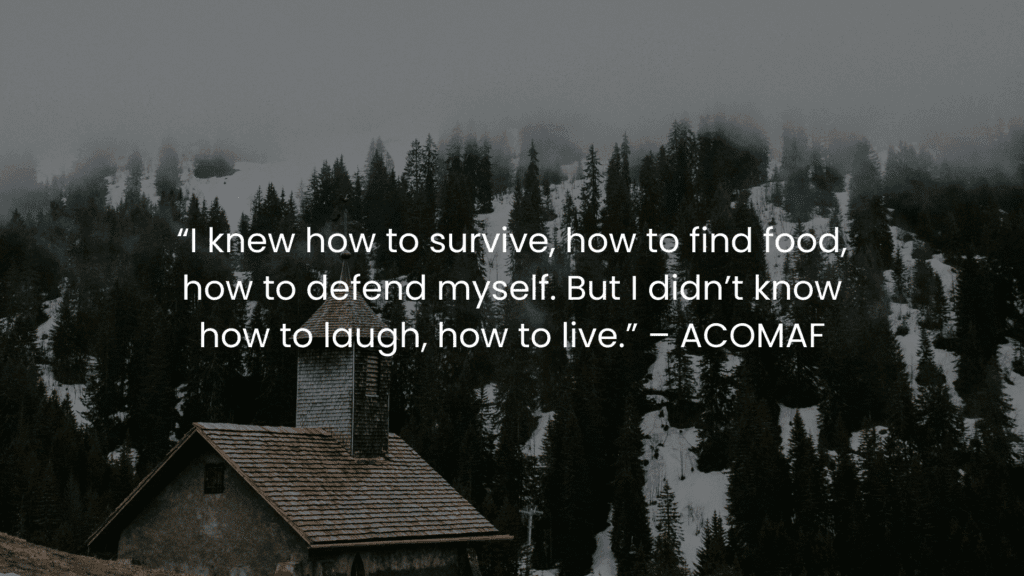
“I had become the provider, the protector. And no one had thanked me for it.” – ACOTAR
This isolation doesn’t just shape her identity, it becomes the lens through which she views the world. She learns not to rely on others, not to speak her needs, and to silence her own desires. Long before she crosses into Prythian, Feyre is already living in a world where love is conditional and rest is dangerous. She is a survivor, but one who has never truly felt safe.
That kind of deprivation leaves deep psychological scars. It teaches a person that love must be earned through suffering, that ease is suspect, and that one’s value is measured by their usefulness. So when Tamlin offers her safety, luxury, and admiration, Feyre clings to it not because it’s the best option, but because it’s the first. She doesn’t have the emotional tools to ask: Do I feel seen here? Do I feel free?
Trauma Bonding and the Illusion of Love
Feyre’s relationships are often framed as epic romances or unbreakable loyalties, but beneath the surface, many of these bonds are forged in pain, desperation, and shared trauma. From Tamlin to Rhysand, and even to the inner circle and Lucien, Feyre consistently attaches herself to people who reflect her wounds. These relationships are not always built on trust or mutual growth. They are trauma bonds, connections formed through survival, not stability.
With Tamlin, Feyre initially feels gratitude. He offers her safety, beauty, and the illusion of peace. But it is not a relationship built on freedom or mutual respect. Tamlin is controlling and emotionally reactive, and Feyre, conditioned to survive and keep the peace, shrinks herself to fit his world. What looks like love is often an obligation. She stays because she feels she owes him, because suffering for love feels natural to her. She believes love must be earned, and Tamlin’s protectiveness feels like a prize she cannot afford to lose, even when it begins to suffocate her.
“He locked me in that house. He locked me in and left.” – ACOMAF
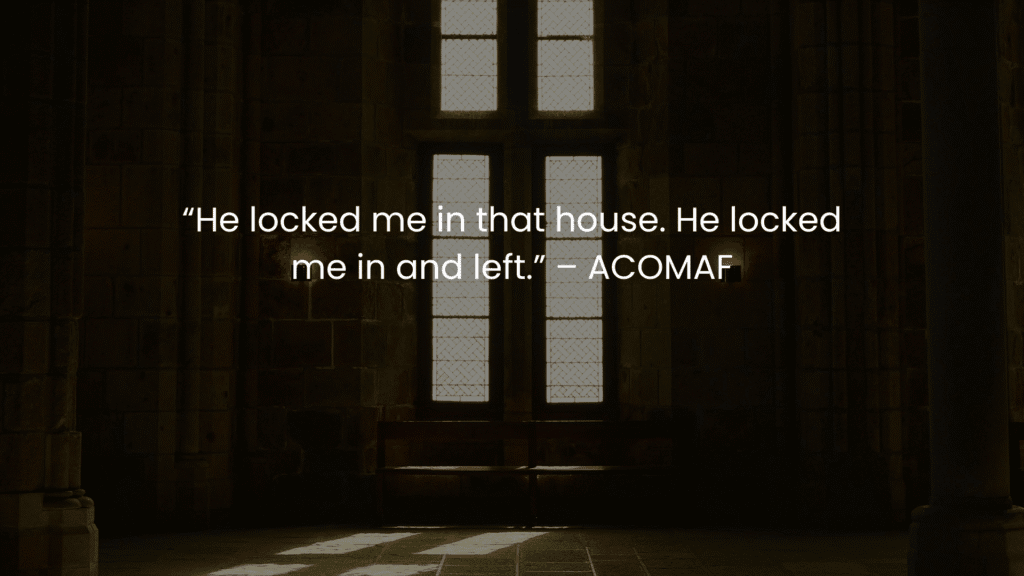
Her bond with Rhysand, though often seen as the healthier alternative, also begins in trauma. He helps her survive Under the Mountain. He is the first to understand her pain, not because he sees her more clearly, but because he shares it. Their connection is forged through mutual damage. Feyre is drawn to him because she sees herself in his suffering. He gives her a new role, a new court, and a new narrative, but this is still not quite freedom. Even in the Night Court, Feyre often performs strength rather than embodying it. She becomes High Lady, yes, but also the emotional caretaker of a group of powerful, wounded people. She takes on everyone’s pain as if it is her own.
Characters like Lucien mirror this dynamic. Feyre connects to Lucien through the shared helplessness they both experience under Tamlin’s rule. He is also a survivor, torn between duty and his own silent rebellions. Feyre feels for him, wants to save him, because she sees his trauma as familiar. She feels connected to anyone who has been hurt, isolated, or caged, because she understands that feeling too well.
“When you spend so long trapped in darkness, Lucien, you find that the darkness begins to stare back.” – ACOMAF
Throughout her time in both the Spring and Night Courts, Feyre is deeply isolated. She does not have friends in the true sense. She has allies, protectors, people she would die for, but not necessarily people she can confide in or be soft with. Her loyalty to Tamlin, Rhysand, Mor, Azriel, Cassian, and even Lucien is intense, but often comes from a place of emotional starvation. These are the only people who truly see her, even if they only see fragments. So she clings to them fiercely, mistaking closeness for connection, and shared pain for love.
“They were my family. They were mine.” – ACOMAF
Feyre believes love must come with sacrifice. That happiness is suspect, and ease is untrustworthy. When Tarquin shows a romantic interest in her she tells Tarquin that it would be easy to love him. Tarquin is gentle, sincere, and open. He offers affection without expectation, and Feyre cannot trust it. There’s no danger, no emotional puzzle to solve. Loving Tarquin would require her to believe she’s worthy of uncomplicated affection, and she’s not there yet.
“I’m thinking it would be very easy to love you…Easy – very easy to fall in love with a kind, considerate male.” ACOMAF
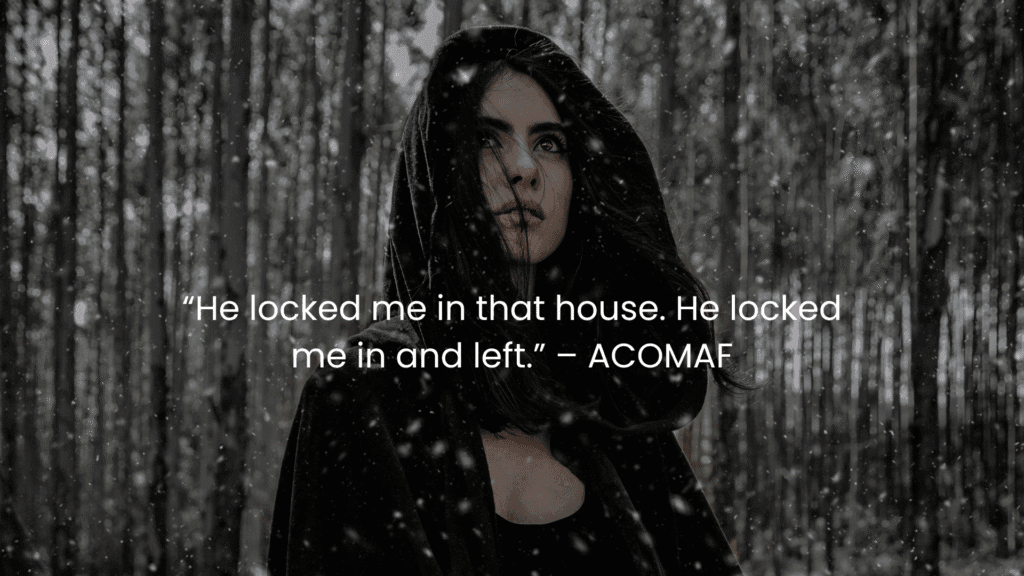
To someone who has known only hardship, love that comes easily feels threatening. It lacks the intensity, the struggle, the need to earn it that she’s come to associate with being valued. She walks away not because Tarquin isn’t enough, but because she doesn’t yet believe she is. This belief traps her in relationships where her role is to give, to fix, to heal, rather than to simply be. Even her romantic love stories are rarely about mutual rest. They are battles, both emotional and literal.
She chooses love that feels earned through hardship because anything else feels undeserved. So the question becomes: is it really love, or just relief from loneliness? Is it freedom, or just a better kind of cage? Feyre’s trauma skews her ability to recognize healthy connections. And while she grows in power, she remains emotionally entangled in relationships that reflect her past pain more than her future healing.
Always Reading the Room, Always Choosing Wrong
Feyre is constantly in survival mode. It’s fair to say that she has been in survival mode since childhood. She went from providing food for her family to being a ‘cursebreaker’ in a new world to a High Lady. She is a watcher, reading facial expressions, gauging danger, calculating consequences. This is a skill that keeps her alive, but it also traps her in cycles of bad decision-making. This is evidenced by the many instances where she ignores her intuition when a detrimental decision is wrong or when a conversation needs more critical thought. She doesn’t believe her intuition is worth following unless it’s backed by emotional urgency or sacrifice.
“I was always watching, always calculating, always thinking of how to survive.” – ACOMAF
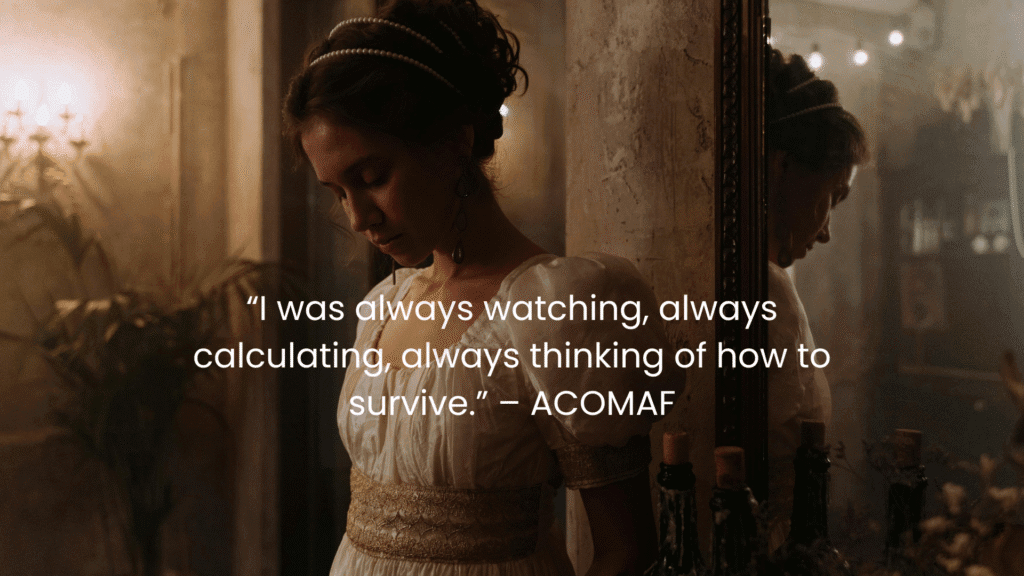
Even her most dramatic acts of bravery often come at the expense of herself. Her default is self-sacrifice, whether it’s hunting in the woods, going Under the Mountain, or pretending to love Tamlin again in ACOMAF. She doesn’t trust herself to rest. She is not making these choices from a place of clarity, but from a place of emotional damage.
The Blind Spots of Illiteracy
One of the most overlooked elements of Feyre’s character is her early illiteracy. She cannot read, literally or metaphorically. She struggles to read text, yes, but also people, power structures, and motivations. Her worldview is shaped by scarcity and desperation. Without the ability to access knowledge on her own, her understanding of the world is filtered through those who have power over her.
“I couldn’t read, not well. I’d never had the time or chance.” – ACOTAR
This lack of education contributes to her narrow point of view. She sees Tamlin as her only option because she has no language or framework for alternatives. Even in the Night Court, she is slowly learning to think differently, but it’s a process, not an instant transformation. Cognitive dissonance is rare in Feyre because she doesn’t have the luxury of second-guessing. To second-guess would be to hesitate, and hesitation, to her, means danger.
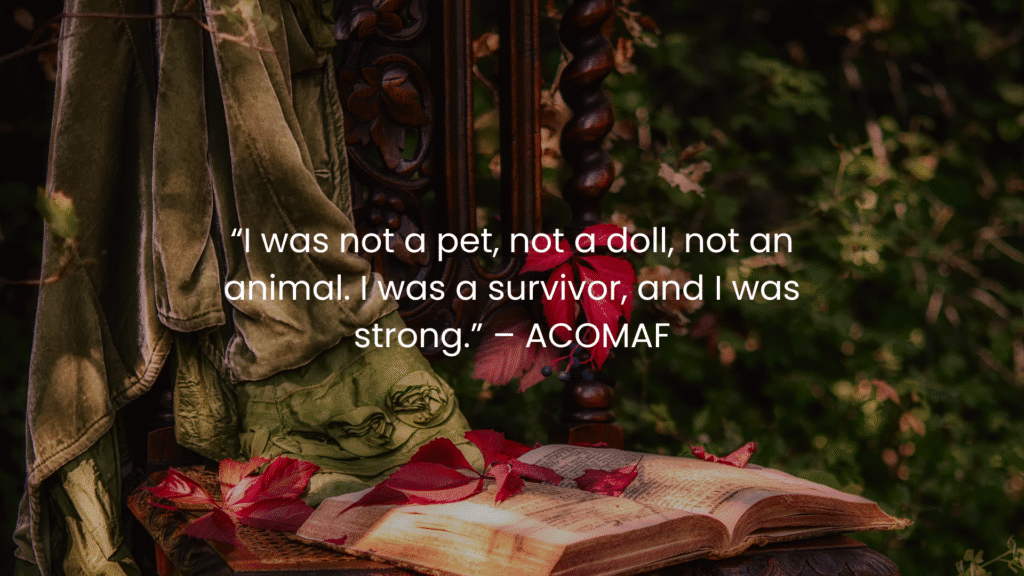
Conclusion: Feyre’s Growth Is Real, but It’s Not Romantic
Feyre’s story is one of pain masked as power. Her growth is messy, complicated, and not always admirable, and that’s exactly what makes it powerful. She doesn’t always make the right choices. She often confuses love with duty, and peace with complacency.
“I was not a pet, not a doll, not an animal. I was a survivor, and I was strong.” – ACOMAF
But through her missteps, we see a woman unlearning survival to learn self-worth.
Feyre is not a perfect heroine. She is a reflection of trauma, of the choices women make when no good choices exist. She is a story about what happens when the world demands strength but never teaches softness.
And in that, Feyre Archeron is not just a character. She is a mirror.
“Only you can decide what breaks you.” – ACOMAF
